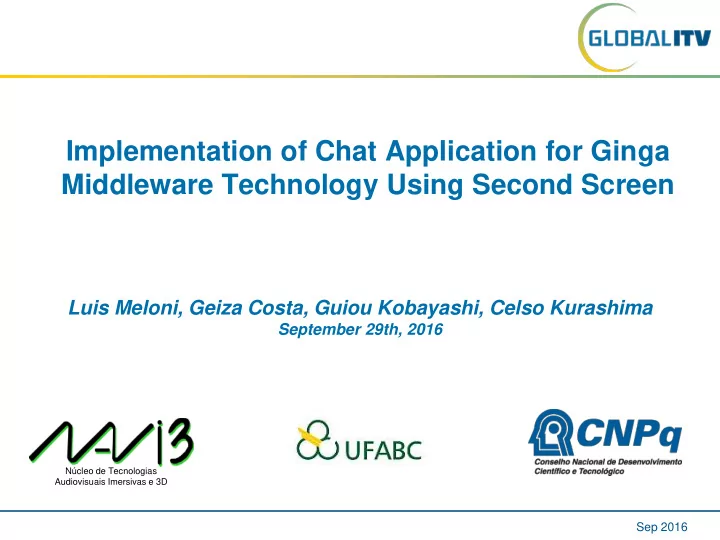

Implementation of Chat Application for Ginga Middleware Technology Using Second Screen Luis Meloni, Geiza Costa, Guiou Kobayashi, Celso Kurashima September 29th, 2016 Núcleo de Tecnologias Audiovisuais Imersivas e 3D Sep 2016
Introduction • In 2014: 98% of homes have a television receiver (analog or digital) and 92% of homes have at least one mobile device [3]. • The increase of digital television receivers and mobile phones are connected to the Internet, and they are capable of executing interactive applications. 2 Geiza Caruline Costa Sep 2016
Goal • This paper proposes an application for second screen devices that allow users to send messages, and immediately display on a digital television screen running a Ginga application. 3 Geiza Caruline Costa Sep 2016
Related Work Fig. 1. Application programs being executed in part of the screen area, in two different digital television systems: (a) Ginga system; and (b) HbbTV system [6]. 4 Geiza Caruline Costa Sep 2016
Related Work Fig. 2. Layout and functionality representation of second screen messaging application for mobile devices. (a) GingaChat system; and (b) HbbTV system. 5 Geiza Caruline Costa Sep 2016
Proposed System Architecture Fig. 3. GingaChat System architecture overview. 6 Geiza Caruline Costa Sep 2016
Data Stream Fig. 4. Data flow of the message and user values from the android application to the digital TV by use of a server. 7 Geiza Caruline Costa Sep 2016
Conclusion This paper demonstrates that interactive and functional applications for the Ginga middleware with use of second screen devices can be developed for consumer TV programs. In the application case, we successfully developed a system called GingaChat that send messages from a mobile device to the television receiver by use of the Internet and a server. 8 Geiza Caruline Costa Sep 2016
Future Work As future work, new scenarios can be envisioned were more functionality can be implemented in the Ginga and second screen applications. Our plan is to develop new similar applications for social networks on mobile devices, which allows users to exchange text messages, audio messages and pictures. 9 Geiza Caruline Costa Sep 2016
References [1] L. C. P. Costa, C. S. Kurashima, M. G. Biase, R. H. Alonso, and M. K. Zuffo , “A technical analysis of digital television broadcasting in Brazil ,” in Proc. IEEE International Symposium on Broadband Multimedia Systems and Broadcasting, London, 2013, pp. 1 – 5. [2] G. C. Costa; and C. S. Kurashima , “ Second Screen Interactive Application for ISDB-Tb Platform,” in : Proc. 2015 IEEE Broadcast Symposium, 2015, Orlando, FL. Alternative Delivery Session, IEEE BTS Symposium, 2015. [3] TIC research, electronic government, [Online] Available: <http://cgi.br/publicacoes/indice/pesquisas/> [Accessed: Apr-11-2016]. [4] Global ITV, “Project Overview” About the Project, 2014, [Online]. Available: <http://globalitv.org/about-the-project> [Acessed: Jul-10-2014]. [5] G. Calixto; C. Keimel; L. Costa; K. Merkel; M. Zuffo , “ Analysis of coexistence of Ginga and HbbTV in DVB and ISDB- Tb,” in Proceeding of the 2014 IEEE Foutrh International Conferece on Consumer Electronics Berlin (ICCE-Berlin), 2014, pp.83-87. [6] Global ITV, “ Deliverable D4.6 – Final Hybrid TV programme related applications ” [Online]. Available:<http://www.globalitv.eu/download/files/public/GLOBALITV-D4.6-- FinalHybridTVProgrammeRelatedApplication_reduced.pdf> [Accessed: Apr-13-2016. 10 Geiza Caruline Costa Sep 2016
Thanks! www.globalitv.org Global ITV is an EU-Brazil consortium. The aim of the project is to http://twitter.com/global_itv develop an interoperable, global platform for interactive television applications. www.facebook.com/globalitv geiza.costa@ufabc.edu.br 11 Geiza Caruline Costa Sep 2016
Recommend
More recommend